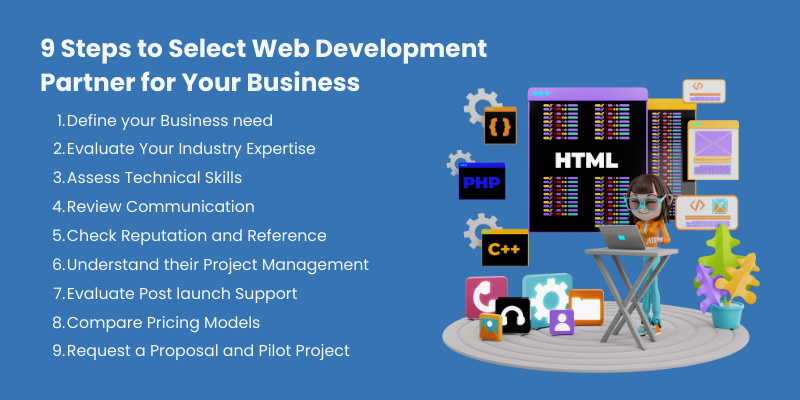In the digital era, a strong online presence is essential for B2B businesses. Whether it's a website, e-Commerce platform, or custom web application, your digital infrastructure must not only function efficiently but also align with your business goals.
A reliable web development partner plays a critical role in bringing your vision to life, ensuring your platform is scalable, user-friendly, and supports business growth.
How to choose a B2B web development partner goes beyond simply creating a functional website, it's about building a strategic partnership that evolves with your business needs.
Choosing the right web development partner can be a challenging task. With so many options available, businesses often face difficulties in finding a partner with the right technical skills, industry understanding, and the ability to provide long-term support.
It's not just about creating a functional website, but about building a strategic partnership that evolves with your business needs.
To make the best choice, it's important to define your goals, understand your technical requirements, and assess the expertise, reputation, and communication skills of potential partners.
This guide will help you navigate the process of selecting a B2B web development partner, ensuring you find a reliable, long-term collaborator who can contribute to your digital success and future growth.
9 Steps to Select the Best Web Development Partner for Your Business
Your website serves as your company's most powerful marketing tool and sales representative. When it's time for a redesign or new development, selecting the right web development company is crucial for success.

But how can you ensure you pick the right partner?
Here are 9 essential steps to guide you in choosing the right web development company as you assess your candidates:
1. Define Your Business Needs
Before choosing a web development partner, it is important to clearly define your business objectives. Identify the type of project you need, whether it's a website, portal, eCommerce platform, intranet, or custom application. Understanding what is web development can help you communicate your requirements more effectively and ensure your partner delivers the right solution.
This helps set a clear direction for your partner to understand your specific requirements.
Next, clarify the scope of your project. Outline the features and functionalities you need, such as user accounts, payment systems, or third-party integrations.
Consider how scalable the solution needs to be to accommodate future growth and evolving business demands.
Understanding the Benefits of B2B Website Development Platforms can also help you choose a solution that fits both your current needs and long-term goals.
Finally, establish your budget and timeline expectations. Be realistic about the resources available and the time required to complete the project.
This ensures that both you and the development company have aligned expectations regarding costs, deadlines, and deliverables.
2. Evaluate Industry Expertise
To ensure a successful partnership, it’s important to assess whether the web development company has experience in your specific industry.
A partner who understands the unique challenges and needs of your sector will be better equipped to create solutions that align with your business objectives.
Review their case studies, client portfolio, and examples of similar projects they’ve completed. This will give you insight into their past work, the types of clients they've served, and the solutions they've implemented.
For instance, if you're in the oil and gas marketing agency sector, look for a company that has worked on similar, high-complexity projects.
Look for evidence of success in projects that closely resemble yours.
Additionally, evaluate their understanding of B2C sales processes and platforms, particularly if your business involves complex systems such as procurement flows, CRM integrations, or ERP solutions.
A strong grasp of these processes ensures the development partner can create a solution that integrates seamlessly with your existing systems and workflows.
3. Assess Technical Skills and Capabilities
It’s essential to evaluate the technical expertise of potential web development partners to ensure they can deliver a high-quality solution that meets your needs.
Begin by reviewing their proficiency with the relevant tech stack, such as .NET, Angular, React, Pimcore, Laravel, or other technologies that align with your project requirements.
Additionally, assess their experience with integrating Content Management Systems (CMS), Customer Relationship Management (CRM), and Enterprise Resource Planning (ERP) systems.
Understanding what is software development can provide context for the technical discussions and help you assess their capabilities more accurately.
Furthermore, ensure they can integrate various B2B marketing services and systems like CMS, CRM, and ERP.
This includes platforms like SharePoint, Salesforce, and HubSpot, which are essential in a tech marketing agency context. Security and compliance are critical, so verify that the partner follows the latest security standards and adheres to regulations, such as GDPR or ISO certifications.
Ensure that their solution can handle common technical issues like the 503 status code, which indicates a service is temporarily unavailable. A reliable partner should have strategies in place to prevent downtime and efficiently manage such issues, minimizing any disruption to the user experience
Security and compliance are critical factors, particularly in B2B projects. Verify that the partner follows the latest security standards and is compliant with relevant regulations, such as GDPR, ISO certifications, or SOC standards.
This helps ensure your platform is secure and adheres to legal and industry guidelines.
Lastly, consider their ability to scale and maintain the solution over time. Your business will evolve, and your digital platform must be flexible enough to accommodate future growth and changing needs.
4. Review Communication and Collaboration Style
Effective communication and collaboration are key to a successful partnership. Evaluate how transparent the web development partner is in their project management.
A reliable partner will keep you informed of progress, challenges, and changes, ensuring that you are never left in the dark during the development process.
Check which tools the company uses for project management and communication, such as Jira, Trello, GitHub, or Slack. These tools can streamline collaboration, track progress, and maintain an organized workflow, allowing for smoother communication between teams.
Assess their responsiveness and ability to engage with your team. Prompt, clear communication is essential to avoid delays and misunderstandings.
Finally, ensure the development partner is flexible and open to feedback and iterations. Web design and development services often require adjustments, and a partner that welcomes constructive feedback will be better equipped to adapt and make changes as needed throughout the project lifecycle.
Explore Our Web Design and Development Services!
5. Check Reputation and References
The reputation of a web development company can speak volumes about the quality of their work. Start by reviewing client testimonials and online reviews.
These provide valuable insights into the experiences of previous clients and the overall satisfaction with the company’s services.
Pay attention to feedback regarding communication, adherence to deadlines, and the quality of the final product.
Look for any industry recognition, certifications, and partnerships that the company may have. These accolades can indicate a level of professionalism and expertise that is recognized by peers and industry leaders.
What are five marketing strategies that retailers spend half of their annual budget on? You can use this question to understand their approach to supporting your ongoing marketing needs.
Certifications, such as ISO or other relevant accreditations, further validate their ability to meet high-quality standards.
A reputable development partner will be willing to connect you with past clients to provide references.
Speaking directly with former clients can give you a better understanding of the company's strengths and potential challenges. This direct feedback can help you gauge whether the partner can truly deliver on their promises.
6. Understand Their Project Management Approach
A clear and structured project management approach is essential for the success of your web development project. Begin by understanding the methodologies the development partner uses, such as Agile, Waterfall, or Hybrid.
Agile allows for flexibility and iterative improvements, while Waterfall offers a more linear, step-by-step approach.
A Hybrid model combines elements of both, offering a balance between flexibility and structure. Choose a methodology that aligns with your project needs and timeline.
Next, discuss how the company handles milestones, deliverables, and the overall reporting structure.
A reliable partner will provide clear timelines and break the project into manageable phases, with defined deliverables for each stage. Regular reporting and updates ensure that you are kept informed of progress and can identify potential issues early.
Finally, assess how the partner handles change requests and unexpected challenges. In any web development project, there are bound to be changes or obstacles.
Ensure that the partner has a clear process for managing revisions, handling scope changes, and addressing unforeseen issues without derailing the project’s timeline or budget.
7. Evaluate Post-Launch Support and Maintenance
Choosing a web development partner isn’t just about the launch , it’s about ensuring long-term success. Evaluate the post-launch support and maintenance services they offer.
This includes hosting, regular updates, and continuous security monitoring to ensure your website or application remains secure and performs optimally.
Additionally, inquire about their approach to organic SEO services and continuous optimization.
A good partner will offer ongoing optimization services to enhance performance and scale your platform to meet increasing traffic and demand.
Check the Service Level Agreement (SLA) commitments to understand their response times for issues such as bug fixes, troubleshooting, and support requests.
A reputable partner should offer clear SLA terms that guarantee timely responses and solutions, minimizing downtime and ensuring a smooth user experience.
Additionally, inquire about their approach to continuous optimization and scaling. As your business grows, your digital platform will need to evolve.
A good web development partner will provide ongoing optimization services to enhance performance, adapt to new technologies, and scale your solution to meet increased traffic and demand.
8. Compare Pricing Models
When evaluating a web development partner, it's essential to understand the different pricing models they offer. Common models include fixed price, time & material, and dedicated team pricing.
- Fixed Price: A set price for the entire project based on the agreed-upon scope and deliverables. This model is suitable for well-defined projects with a clear scope but may have limited flexibility for changes.
- Time & Material: Billing based on the actual time spent and resources used. This model is flexible and ideal for projects where requirements might evolve, but it can lead to higher costs if the scope isn't clearly defined.
- Dedicated Team: A long-term approach where a team is assigned to your project, and you pay for their services on a regular basis. This model is perfect for ongoing projects or businesses requiring continuous development and support.
Finally, focus on the return on investment (ROI) and value the partner can deliver, rather than just choosing the lowest cost option. While cost is important, it’s crucial to assess the overall value and quality the partner provides to ensure long-term business success.
9. Request a Proposal and Pilot Project
Once you’ve shortlisted potential web development partners, the next step is to request detailed proposals. A strong proposal should include a clear timeline, budget estimates, and specific deliverables for each phase of the project.
This helps you assess the feasibility of the project and ensures both you and the vendor have aligned expectations on scope and milestones.
To further evaluate their capabilities and fit, request a small pilot project or proof of concept (PoC). This allows you to assess their technical expertise, communication, and ability to meet deadlines without committing to the full project.
A pilot can be a small feature or a portion of the website, which provides a clearer understanding of the quality of their work and how well they collaborate with your team.
Compare the proposals and pilot results from different vendors objectively. Consider factors such as the quality of their past work, the strength of their proposal, their understanding of your business needs, and how well they meet your technical and creative expectations. This comparison will help you make a more informed decision.
Conclusion
Choosing a B2B web development partner is not just a one-time decision; it's a long-term strategic move that can significantly impact your business’s digital success. In how to choose a B2B web development partner, it's essential to focus on finding a partner whose capabilities align with your business needs, values, and goals, rather than simply selecting the cheapest option. It’s essential to focus on finding a partner whose capabilities align with your business needs, values, and goals, rather than simply selecting the cheapest option. Trust and communication are key elements in this partnership. Ensure the vendor demonstrates transparency, reliability, and the ability to adapt to your evolving needs over time.
While cost is an important consideration, it should not overshadow the importance of quality, expertise, and a shared vision for success. One example of a company that excels in these areas is Centric, a digital transformation agency that has a proven track record of delivering high-quality solutions. Take the time to shortlist potential partners carefully and always validate their credentials with real references and case studies. Take the time to shortlist potential partners carefully and always validate their credentials with real references and case studies. This due diligence will help ensure that you choose a development partner who not only delivers on your immediate project requirements but also supports your growth and success in the long run.









